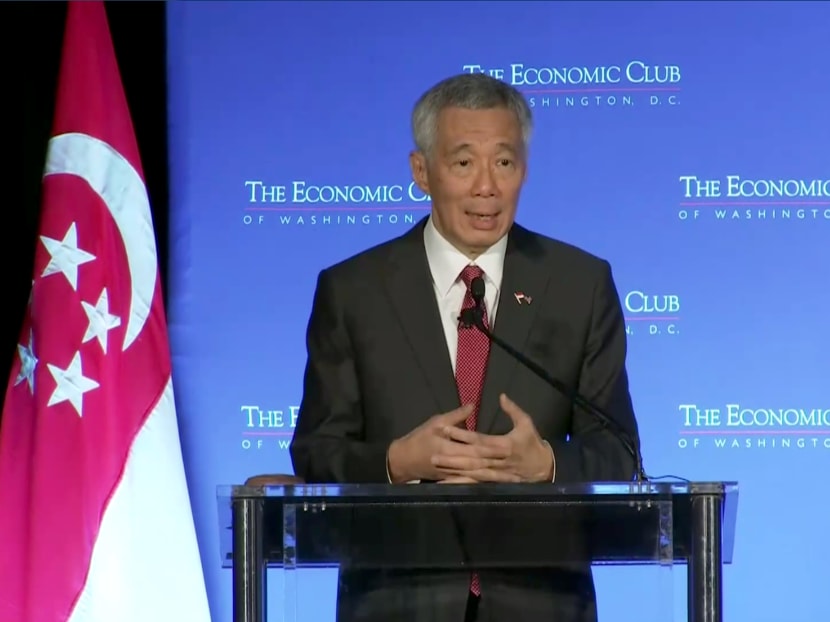PM Lee urges the US to uphold free trade and sustain economic ties with Asia
WASHINGTON – The United States' relations with Asia has not “been turned upside down” despite the different approach taken by the Trump administration on some issues, said Prime Minister Lee Hsien Loong in urging Washington to uphold free trade and sustain economic engagement with the region.

PM Lee Hsien Loong speaking at the Economic Club of Washington DC on Monday (Oct 23). Photo: Mediacorp
WASHINGTON – The United States' relations with Asia has not “been turned upside down” despite the different approach taken by the Trump administration on some issues, said Prime Minister Lee Hsien Loong in urging Washington to uphold free trade and sustain economic engagement with the region.
“Trans-Pacific trade exceeds Trans-Atlantic trade," Mr Lee pointed out in a speech at the Economic Club of Washington DC on Monday (Oct 23), ahead of his White House meeting with President Donald Trump.
American multinationals already have major investments in many Asian countries. With the Asia Pacific region’s economies accounting for two-thirds of global growth, there would be abundant new business opportunities going forward, he noted. The Association of South-east Asian Nations (Asean), for instance, will become the world’s fourth largest single market by 2030.
However, Mr Lee reminded his audience, most of whom were from the business community, that economic interests could not be separated from the major strategic and security concerns in the region - particularly the state of Sino-US ties, and America's relations with its Asian allies Japan, South Korea, Australia, and the Philippines.
“The peace and stability of the Asia Pacific is a vital US national security interest,” said Mr Lee, noting that successive US administrations, both Republican and Democrat, have strived for the stability of the region and worked to develop better relationships with Asia.
Some of the Trump administration's recent decisions have raised questions about US policy and commitment towards Asia.
Mr Trump has, for instance, pulled the US out of the landmark Trans-Pacific Partnership (TPP) trade pact, which would have accounted for around 40 per cent of global GDP. He has also shown disdain for multilateral engagements and expressed his preference for bilateral ones.
This has prompted concerns among observers that the US would turn inwards, with China likely filling the void and dominating the regional economic order.
In his speech, Mr Lee noted that China has been the single most important driver of Asia’s prosperity and integration, while it is also the largest trading partner of nearly every Asian country.
While Asian countries want to benefit from the trade and economic opportunities that China offers, and welcome Beijing’s initiatives to develop win-win partnerships with its neighbours, they also want to cooperate with the other major powers.
“Asian countries want an open, inclusive regional architecture, and at the same time they do not to see a world divided into rival blocs,” said Mr Lee.
“They have prospered under a global, multilateral system of trade and finance. They have substantial economic links with Europe and the US. They want to maintain and grow these links, even as they deepen cooperation within the Asian region.”
He urged the US to continue to adopt a policy of sustained economic engagement of the region.
“Asia has abundant opportunities for US businesses. There are investment and technological gaps in Asia as the economies grow rapidly. And these are opportunities where American companies can step into,” he said.
“The growing middle class that purchases innovative and high quality products is another growing market that has great scope for American businesses to grow new markets, make fresh investments, and create prosperity on both sides of the Pacific.”
The key, Mr Lee noted, lies in how the US responds to several major questions.
“Does the US still believe that it has the most to gain from an interdependent world, open exchanges and multilateral rules? In particular, how will US relations with China develop?” he asked.
“How America answers these questions will determine not just prosperity, but war and peace, not just in Asia, but in the world.”






